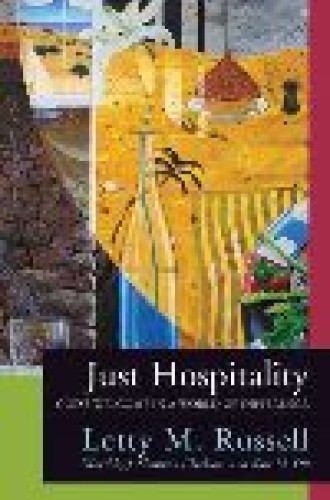Just Hospitality: God's Welcome in a World of Difference
This book is a work of love. Letty Russell, longtime professor at Yale Divinity School, died July 12, 2007, in her home, surrounded by family and friends in a way that epitomized her own practice of hospitality. Two of her close friends, her longtime companion and collaborator, J. Shannon Clarkson, and her student and teaching assistant, Kate M. Ott, decided to put together the book on hospitality that she was committed to writing. This was a major task. Although Russell had lectured and taught on hospitality for years, she had not yet begun to write the book. Clarkson and Ott constructed this volume from her voluminous notes, her lectures and the syllabi of her classes. They were uniquely qualified to put themselves into Russell’s mind in order to edit her book, and we are the beneficiaries of their love and commitment.
For Russell, hospitality is central to the mission of the church. It is above all a work of justice-making, expressing love across human differences that have long been sources of injustice and oppression. She employed a postcolonial lens to analyze the differences that divide the world. We are all the product of centuries of colonial oppression that have shaped the church as well as society. And not only does the colonizer/colonized divide separate us from one another, we stand on different sides of this divide within ourselves. We all partake of different kinds of hybridity, being privileged in certain ways and disprivileged in others.
Always something of a misfit in both American society and her church, Russell began serving as a pastor in 1951 and was one of the first women ordained in the United Presbyterian Church (in 1958). In her later years she was excluded from a pastorate because she was a lesbian. In reaching out to empower women leaders of Asia, Africa and Latin America in the Doctor of Ministry program she created for them at San Francisco Theological Seminary, she was always aware of her own privilege as a white American theology professor. She sought to use her power to empower other women without patronizing or demeaning them. Just hospitality requires growing self-knowledge as well as communication with the other to create communities of mutual flourishing.
Russell was ever the biblical theologian, and her insightful rereading of key biblical texts is evident in these writings. She knew that the Bible not only can be misread but contains oppressive texts, and that people can use it for “textual harassment” (her term) to reject others. This book helps us to reread the stories of the tower of Babel (Genesis 11) and Pentecost (Acts 2) as keys to a biblical understanding of difference. Difference of language is not bad but a gift of God that prevented the original unity of language from becoming a tool of domination. Moreover, difference of language was not abolished in Pentecost. What happened, rather, is that people were enabled to understand each other even as they spoke different languages. Differences should be celebrated even as we learn to understand each other in our differences.
Hospitality, for Russell, is God’s welcome to us all in our differences. We seek to embody God’s welcome even as we discover God’s presence in the others who receive our welcome. In receiving the stranger, we have “entertained angels without knowing it” (Heb. 13:2). In reaching out to the hungry, the thirsty, the naked, the sick, the imprisoned, we meet Christ in them. In her final book, compiled by friends, Letty Russell gives us a precious summation of her own life as one who sought to welcome the stranger and make the church a truly healing community.





